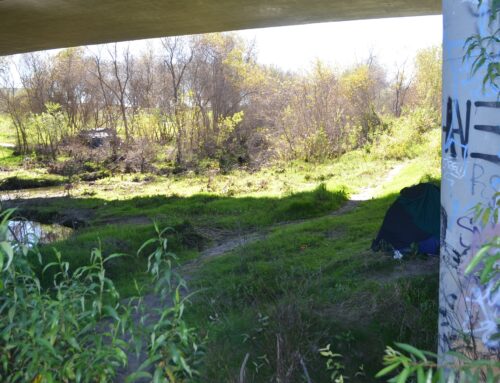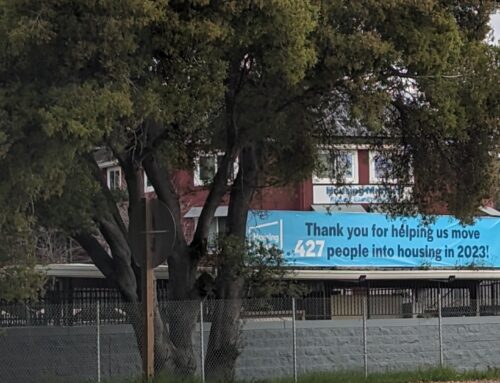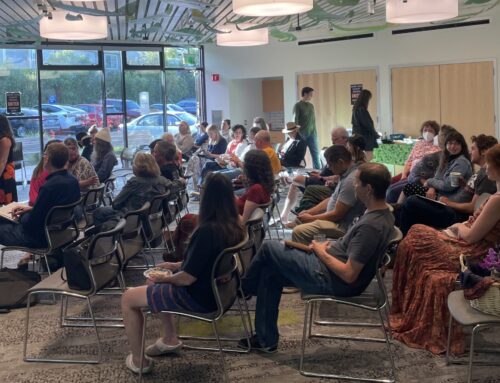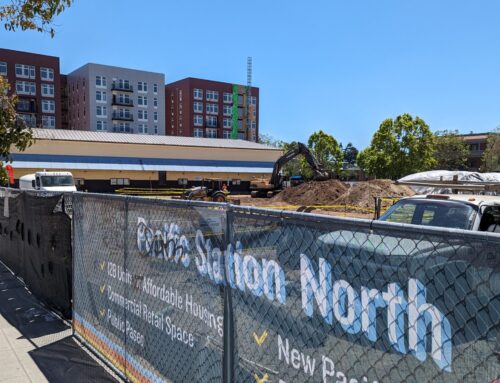SANTA CRUZ >> The Santa Cruz City Council delayed a proposed law revision Tuesday that would have made it easier for the city to clear homeless camps deemed a nuisance on public property, in favor of further review and public input.
The proposal came after a homeless camp known as the “Phoenix Camp” appeared Nov. 10 at Highway 1 and River Street where the Ross Camp formed earlier this year. The Phoenix Camp had rules, portable toilets, handwashing stations and a check-in table, managed and paid for by activist groups.
Most of the vacant lot is owned by the city. The rest of the land is owned by CalTrans. The lot had been fenced off to the public since the city closed the Ross Camp earlier this year.
Camp organizers cut a padlock on the gate when the Phoenix Camp formed, the city attorney said.
The camp grew to about 50 tents within five days, organizers said.
Santa Cruz police closed the camp Nov. 15 without warning. City leaders determined that the campers were trespassing, so the city didn’t have to follow its protocol for closing homeless camps, City Attorney Tony Condotti said in an interview.
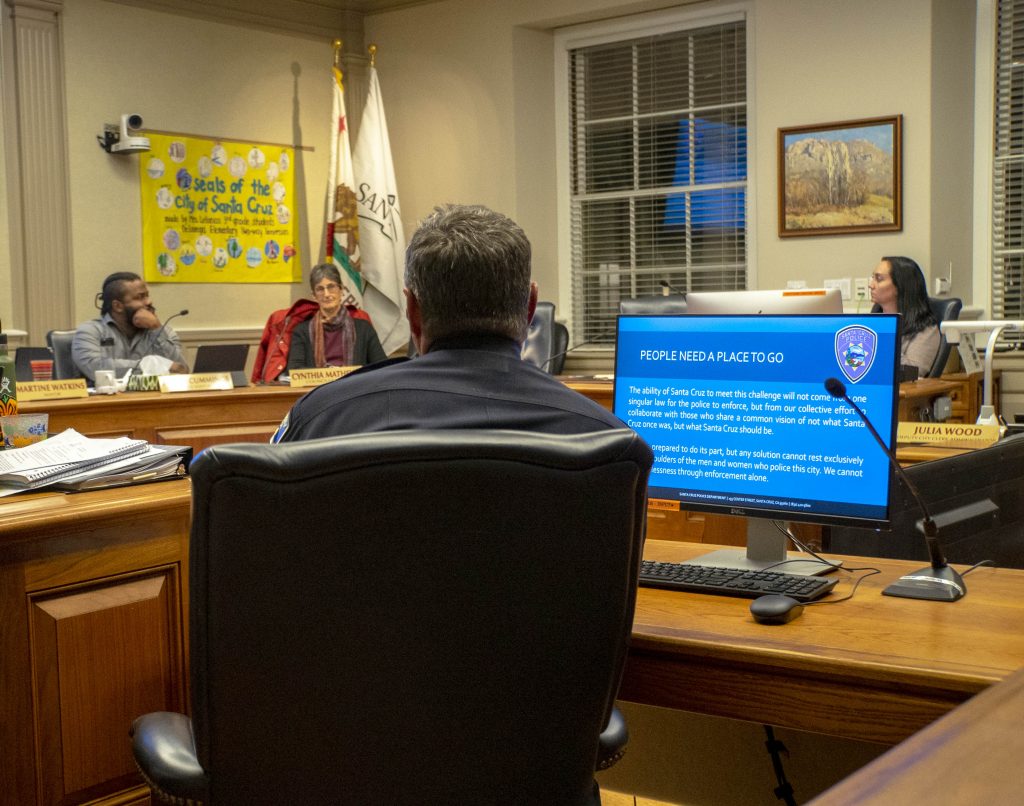
City staff offered two-day motel vouchers to at least some campers, Lucero Luna, a camp organizer, said in an interview. Luna was the sole person cited for trespassing. She told police she would not move and asked others to join her in civil disobedience, she said.
Luna, 60, has been sleeping outside since the camp was closed. Tuesday night, she planned to improvise shelter from the rain.
“Inverted trash bags,” Luna said. “I just make a hole for my neck and I can wear my backpack.”
The proposed revisions to the city’s camping law include:
- Narrowing the city’s current ban on camps on public property to certain hours, 7 a.m. to 10 p.m.
- The update also would outlaw camping from 10 p.m. to 7 a.m., except it would not be enforced against homeless people when there aren’t enough shelter beds available.
For more on the proposed law, read Santa Cruz Local’s report on the city attorney’s recent presentation at the Community Advisory Committee on Homelessness. Tuesday, the city attorney slightly changed that proposal to respond to opposition from the ACLU. Tuesday’s proposal does not prohibit the use of blankets and tents during the day in parks, beaches or on private property, if the person doesn’t appear to be setting up an overnight camp.
WHAT DID THE COUNCIL DECIDE?
Earlier in the meeting, City Manager Martín Bernal listed three forms of emergency shelter that the city needs:
- More winter and year-round shelter beds
- On-call beds, that police could send homeless people to in the middle of the night, after regular shelter intake closes
- A new home for the River Street Camp, a city- and county-sponsored camp managed by the Salvation Army. The city lot at 1220 River St. will close to campers in March when the water department starts necessary repairs to a pipeline.
The city council voted unanimously to work with the county to meet the shelter needs called for by Bernal, as well as managed safe-parking areas. The council also voted to send the city’s proposed camping law revisions, as well as the county’s similar camping law, to the city’s Community Advisory Committee on Homelessness. The city council wants “expeditious review and recommendations for a county-wide response,” according to a motion made by Vice Mayor Justin Cummings.
It’s unclear when the homelessness committee will have room on its agenda. It has two community listening sessions planned for its upcoming meetings. The public is encouraged to attend.
WHAT: A community engagement workshop on public health and hygiene, including toilets and showers
WHEN: 6-7:15 p.m. Tuesday Dec. 3
WHERE: Harbor High School, 300 LaFonda Ave., Santa Cruz
WHAT: A community engagement workshop on safe sleeping and camping
WHEN: 6-7:15 p.m. Tuesday Dec. 17
WHERE: Veteran’s Memorial Building, 846 Front St., Santa Cruz
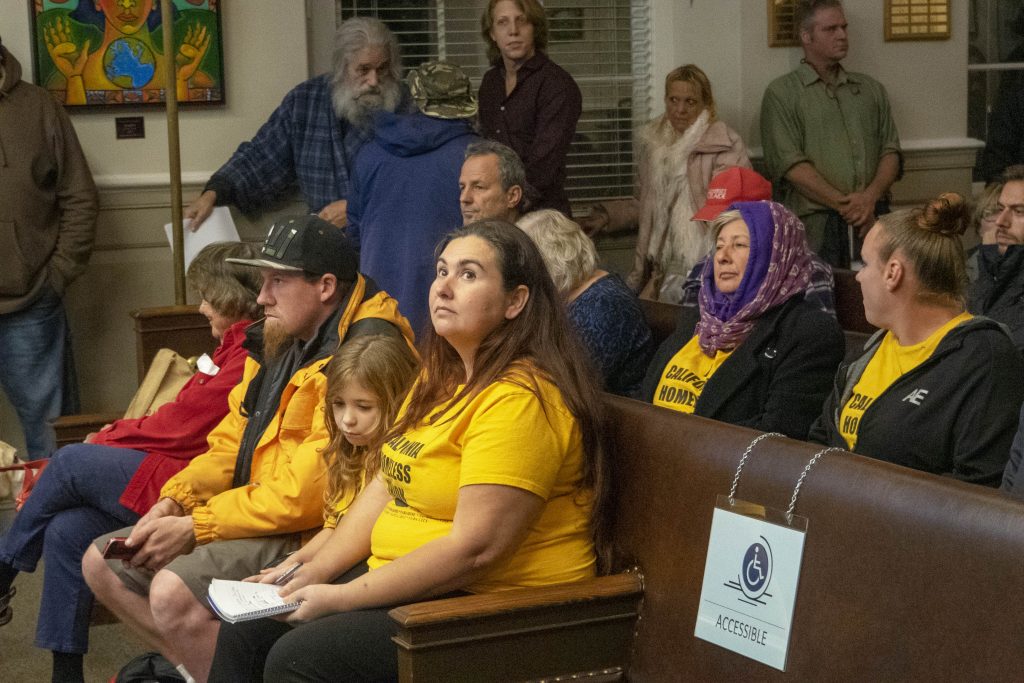
UPDATE ON SEQUEL TO THE CORRIDOR PLAN
The Corridor Plan was a controversial effort by the city to update zoning to match the higher housing density called for in the city’s General Plan. The idea was to plan for more housing along the city’s busy transit corridors: Water Street, Mission Street, Soquel Avenue and Ocean Street.
The Corridor Plan was put on hold a few years ago because many people, especially a group on the Eastside, did not want to see more density in their neighborhoods. In August, the city council killed the Corridor Plan, but directed city staff to still work to “resolve the existing inconsistencies” between zoning and the General Plan.
Tuesday, the city council took a step toward possibly updating the General Plan and redistributing planned density from the city’s busy transit corridors elsewhere, such as downtown.
The motion, made by Councilmember Sandy Brown, directed the planning department to analyze the number of units that would need to be transferred from Water and Soquel streets to keep the density that current zoning allows. That part of the motion passed unanimously.
The second part of Brown’s motion directed staff to analyze “properties where transferred densities might be appropriate in the Downtown, properties on the far west side, in other areas of the city, or in alternative configurations.” That motion passed 4-3, with Vice Mayor Cummings and Councilmembers Brown, Drew Glover and Chris Krohn in favor and Mayor Martine Watkins and Councilmembers Donna Meyers and Cynthia Mathews against.

Meyers said she thought Brown’s motion was premature, and the community, not the council, should lead the discussion on where density could be moved.
A new state law, SB330, prevents Santa Cruz from decreasing the density planned for along its transit corridors, unless the city puts that same density elsewhere in the city.
Moving that density would call for a general plan update, which would cost $750,000 to $1.2 million, former city planner Sarah Fleming said in an interview last month. Depending on where those planned housing units were moved, it would require different levels of environmental review.
NEW LEADERSHIP ON COUNCIL
The city council unanimously elected Justin Cummings as mayor for 2020. Donna Meyers was elected vice mayor, with a 6-1 vote. Councilmember Drew Glover was the sole no vote.
Glover nominated Sandy Brown as vice mayor, but she declined.
The city’s charter calls for an annual election of the mayor and vice mayor. But the council’s custom calls for the top two vote-getters in each election to serve terms as mayor and vice mayor. Cummings and Meyers were the top two vote-getters in 2018.
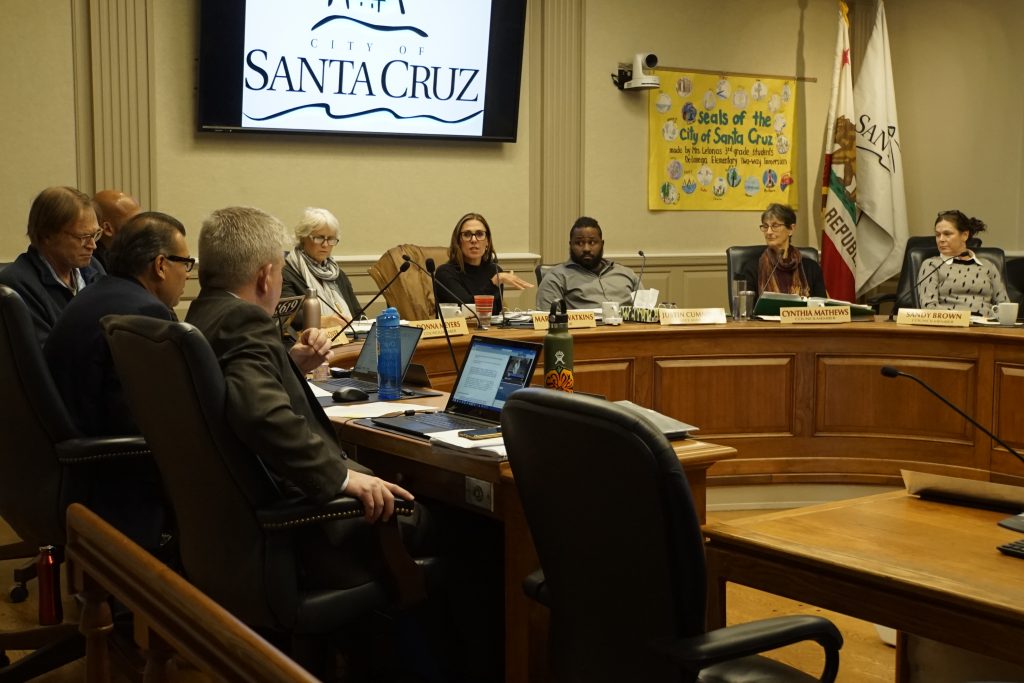
PROPOSED LAW ON HEALTH IN ALL POLICIES
The city council unanimously advanced a proposed law that requires the city to take community well-being, health and equity in all city decision-making, policy, budgeting and services.
The new law was drafted by the council’s Health in All Policies subcommittee of Mayor Martine Watkins, Vice Mayor Justin Cummings and Councilmember Cynthia Mathews, along with city staff, led by Santa Cruz Sustainability and Climate Action Manager Tiffany Wise-West.
Health in All Policies is a policy framework used in communities nationwide. Gov. Gavin Newsom has also prioritized Health in All Policies work in this year’s state budget.
The council subcommittee has led a series of community listening sessions, surveys and outreach to help inform the proposed law.
Tuesday, the council also unanimously approved the subcommittee’s recommendation that staff reports for city council and commission agendas include Health in All Policies language.
VOTERS TO DECIDE ON RECALL
City voters will decide in the March 3 primary election whether Councilmembers Chris Krohn and Drew Glover should be able to keep their seats.
The Santa Cruz County Clerk last week confirmed that the recall campaign got enough registered voter signatures.
Tuesday, the city council voted 4-3 to place the question on the ballot. Mayor Martine Watkins, Vice Mayor Justin Cummings and Councilmembers Cynthia Mathews and Donna Meyers voted in favor. Councilmembers Chris Krohn, Drew Glover and Sandy Brown voted against.
If the council had declined to place the question, state law would have required the county clerk to place the question.
Before the vote, Glover asked his colleagues to force the county clerk to place the question, as a show of support. Glover said the recall sets a “dangerous precedent in which a small minority of citizens can start a citizen petition-gathering process based on lies.”
About a dozen people spoke in support of Glover, and some for Krohn as well.
City voters will see four questions on the March 3 ballot related to the recall. The first two questions would be about whether councilmembers Glover and Krohn each should be recalled. A majority vote is required for Krohn and Glover to lose their seats.
Assuming candidates file, voters will also choose from a list of candidates for each seat, should Krohn and Glover be recalled. Prospective candidates have until Dec. 19 to file. Candidates could only file for one seat, not both.
The top vote-getter for each seat would serve the remainder of the term.
EVICTION RULES FOR SECTION 8 TENANTS
Tuesday, the city council unanimously approved an emergency law that would retroactively apply eviction protections for Section 8 tenants.
The rules mirror those of AB1482, a new state law. AB1482 requires landlords to list a “just cause” when they give tenants notices to leave. Those causes include: the landlord or their family moves in, a substantial remodel, or the tenant has broken a lease. AB1482 also caps rent increases to 5 percent plus inflation.
Last month, the city council passed an emergency law that retroactively enacted AB1482’s eviction rules to Sept. 1. The council worried that landlords would force no-cause evictions and raise rents before AB1482 takes effect Jan. 1.
Tuesday’s action extends those same protections to Section 8 tenants, retroactive to Sept. 1. City leaders, including the city attorney, have said it’s unclear whether AB1482’s eviction rules apply to Section 8 tenants.
Those eviction protections include the just cause requirement and one month of relocation assistance, equivalent to the full rent amount, not just the portion paid by the Section 8 tenant.
REPORT BY REVENUE COMMITTEE
The city may ask voters in November 2020 to increase the city’s transient occupancy tax (TOT). Hotel guests pay this tax as part of room costs. It could raise about $1 million, according to the staff report.
A city council committee of Councilmembers Sandy Brown and Cynthia Mathews announced this intention Tuesday. The city council formed this committee during budget hearings in May, to find more revenue for the city. At the time, the city was facing a $3.9 million projected deficit, before the city cut its way to a balanced budget.
The committee originally eyed the March ballot for a measure to increase the TOT by 2-3%. But a polling firm found it would be difficult to pass on the March ballot due to “low approval ratings for the City Council and some city departments” and the possibility of organized opposition, among other reasons, according to the staff report.
The committee has also recommended two possible development fees to fund public safety and facilities for child care. These fees can be approved by the council and do not require voter approval. These fees would be paid for by developers ー a possible tiered fee per square foot.
The committee also considered a real estate transfer tax increase which could raise between $5 million to $12 million. This tax could be collected when real estate is sold. The committee has not prioritized this option, but it also has not eliminated it.
Editor’s note: This post has been updated to reflect a change in schedule for the Dec. 3 and 17 Community Advisory Committee on Homelessness meetings.
Kara Meyberg Guzman is the CEO and co-founder of Santa Cruz Local. Prior to Santa Cruz Local, she served as the Santa Cruz Sentinel’s managing editor. She has a biology degree from Stanford University and lives in Santa Cruz.


